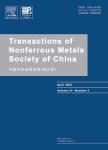Mechanism of aluminum corrosion in LiFSI-based electrolyte at elevated temperatures
LiFSI电解液高温下的铝箔腐蚀机理作者机构:College of Petrochemical TechnologyLanzhou University of TechnologyLanzhou 730050China CAS Key Laboratory of Comprehensive and Highly Efficient Utilization of Salt Lake ResourcesQinghai Institute of Salt LakeChinese Academy of SciencesXining 810008China
出 版 物:《Transactions of Nonferrous Metals Society of China》 (中国有色金属学报(英文版))
年 卷 期:2021年第31卷第5期
页 面:1439-1451页
核心收录:
学科分类:080503[工学-材料加工工程] 0808[工学-电气工程] 08[工学] 0805[工学-材料科学与工程(可授工学、理学学位)]
基 金:the financial supports from the National Natural Science Foundation of China (Nos. 21766017, 51962019) the Major Science and Technology Projects of Gansu Province, China (No. 18ZD2FA012) the Chinese Academy of Sciences “Western Light” Young Scholars Project Lanzhou University of Technology Hongliu First-class Discipline Construction Program, China
主 题:lithium-ion batteries LiFSI-based electrolyte lithium bis(oxalate)borate(LiBOB) corrosion inhibition elevated temperatures interfacial film
摘 要:Lithium bis(fluorosulfonyl)imide(LiFSI) is a promising replacement for lithium hexafluorosphate due to its excellent properties. A solution to the corrosion of aluminum(Al) current collectors by LiFSI at elevated temperatures is essential. The mechanisms of Al corrosion in LiFSI-based electrolyte at 45 ℃ were studied with density functional theory calculations and spectroscopic investigations. It is found that the irregular, loose and unprotected AlF3 materials caused by the dissolution of co-generated Al(FSI)3 can exacerbate Al corrosion with the increase of temperature. Lithium bis(oxalate)borate(LiBOB) can effectively inhibit the Al corrosion with a robust and protective interphase;this can be attributed to the interfacial interactions between the Al foil and electrolyte. Boron-containing compounds promote the change from AlF3 to LiF, which further reinforces interfacial stability. This work allows the design of an interface to Al foil using LiFSI salt in lithium-ion batteries.



